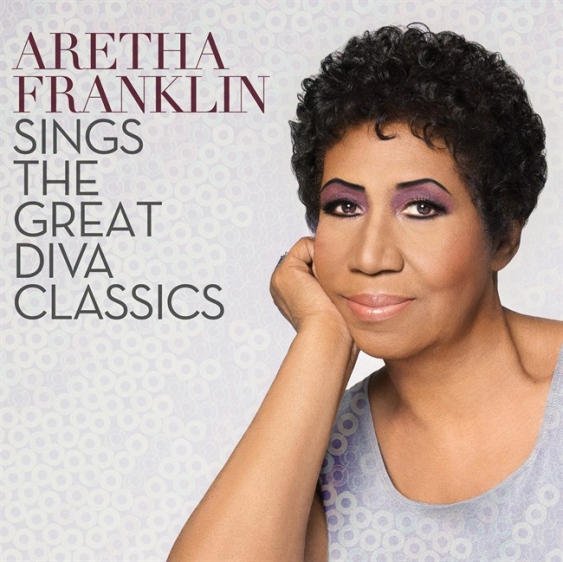Aretha Franklin is an American treasure: one of, if not THE most talented singer of her-or anyone’s-generation. The Queen of Soul’s gospel-derived pipes are generally a treat to hear, although her material’s been inconsistent longer than I’ve been alive. You know that thing people always say about someone sounding so good you’d listen to them sing the phone book? Well, Aretha’s been singing some variation of the phone book (with the occasional gospel or funk-derived boost of inspiration) for much of the past four decades. Since her glory days ended with 1976’s Curtis Mayfield-helmed Sparkle soundtrack, the Queen has chased trend after trend. There was an ill-advised foray into disco, a Luther Vandross-assisted trip down the post-boogie train, a few stabs at MTV-ready pop/rock, and dalliances with contemporary soul styles that found Aretha collaborating with Lauryn Hill, Babyface, Puff Daddy and Mary J. Blige, to name a few artists who have kissed the ring.
 Legendary diva lover Clive Davis has been the primary creative guiding force in Aretha’s career since the early ‘80s, and the two have reunited after over a decade apart for Aretha Sings The Great Diva Classics. Davis has been most successful in the past decade by helming successful but creatively bankrupt covers collections by Rod Stewart and Barry Manilow, and he sadly takes Aretha down the same path with an even sadder twist: the Manilow and Stewart albums were obviously geared towards a boomer audience, largely consisting of standards and/or ‘70s and ‘80s easy listening chestnuts. Diva Classics has at least a pinky toe in contemporary relevance, which means that in addition to well-rendered standards like “At Last” and “Teach Me Tonight,” you also hear an Auto-tuned Aretha warbling Adele’s “Rolling In The Deep.” That song is the biggest embarrassment on an album that serves no purpose other than to ostensibly place Aretha high on the charts alongside other 70+ artists like Tony Bennett, Barbra Streisand & Neil Diamond.
Legendary diva lover Clive Davis has been the primary creative guiding force in Aretha’s career since the early ‘80s, and the two have reunited after over a decade apart for Aretha Sings The Great Diva Classics. Davis has been most successful in the past decade by helming successful but creatively bankrupt covers collections by Rod Stewart and Barry Manilow, and he sadly takes Aretha down the same path with an even sadder twist: the Manilow and Stewart albums were obviously geared towards a boomer audience, largely consisting of standards and/or ‘70s and ‘80s easy listening chestnuts. Diva Classics has at least a pinky toe in contemporary relevance, which means that in addition to well-rendered standards like “At Last” and “Teach Me Tonight,” you also hear an Auto-tuned Aretha warbling Adele’s “Rolling In The Deep.” That song is the biggest embarrassment on an album that serves no purpose other than to ostensibly place Aretha high on the charts alongside other 70+ artists like Tony Bennett, Barbra Streisand & Neil Diamond.
The inherent issue with covers albums is that most of them don’t offer much beyond the novelty of hearing a familiar voice tackle songs that you identify with another artist. Although Aretha has certainly proven herself more than capable of successfully reinterpreting the material of songwriters from Otis Redding to the Rolling Stones, Diva Classics doesn’t offer anything as refreshing as her takes on “Respect” or “Jumpin’ Jack Flash.” Instead, Aretha lends her pipes to songs that are incredibly shopworn. No matter how talented the vocalist-no one needs to hear another cover of “Midnight Train To Georgia” or “I Will Survive.”
It doesn’t help matters that the production of Diva Classics is antiseptic and devoid of passion or soul. The uptempo tracks all sound like songs you’d hear in a small-town gay bar at 3 PM on a Wednesday, and the ballads aren’t far removed from elevator music. Two songs are worth the time it takes to listen-a sunny, reggae-fied take on Alicia Keys’ “No One,” and a swinging interpretation of Prince’s “Nothing Compares 2 U,” which shows off Aretha’s jazz chops better than anything she’s recorded in 20 if not 30 years.
As you well know, two salvageable songs do not a good album make. While Aretha’s voice has lost some of its luster, it’s still an instrument that warrants your attention. Maybe someone will be able to put it to good use again before she leaves this Earth. If history and the quality of Diva Classics is any indication, it certainly won’t be Clive Davis.
Grade: C

